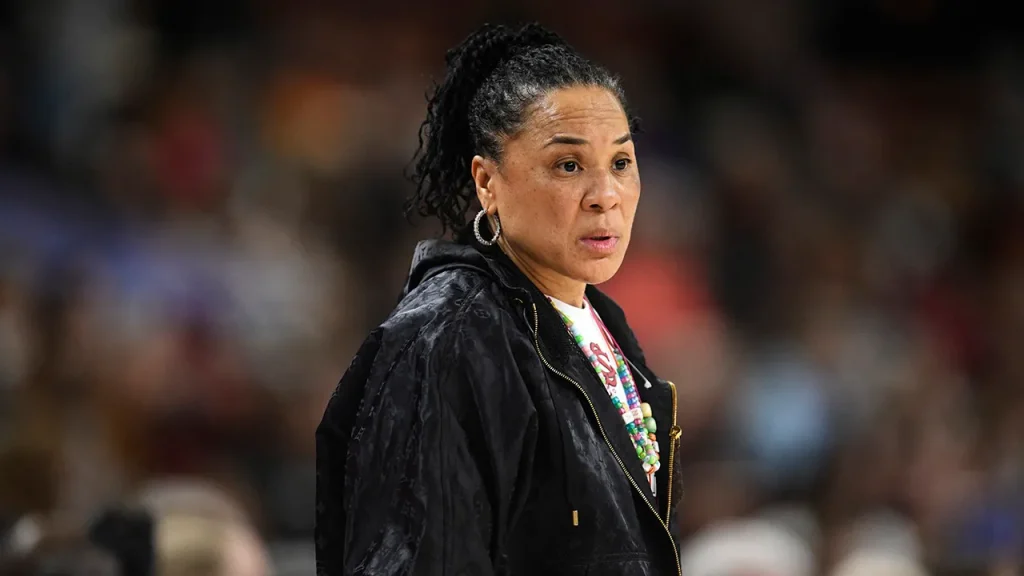Dawn Staley’s Reflections on NBA Coaching Opportunities for Women
Dawn Staley, a basketball legend with an extraordinary resume as a six-time WNBA All-Star, Olympic gold medalist, and Hall of Famer who has led the South Carolina women’s basketball team to three NCAA championships, recently shared candid thoughts about her interview experience with the New York Knicks. After being considered for the head coaching position following Tom Thibodeau’s departure in June, Staley opened up about the broader implications for women in NBA coaching. Though the Knicks ultimately hired Mike Brown, Staley’s reflections provide valuable insight into the challenges women face when pursuing coaching positions at the highest level of men’s professional basketball.
At the heart of Staley’s concerns is the unique pressure and scrutiny a female head coach would face compared to her male counterparts. “If I’m the Knicks coach and you have a five-game losing streak, it’s not going to be about the losing streak, it’s going to be about being a female coach,” she explained to reporters. Staley emphasized that NBA franchises interested in hiring women must be prepared to handle this additional layer of scrutiny and criticism. Her perspective suggests that while interviews may be granted to female candidates, organizations must genuinely commit to supporting them through the inevitable challenges that would come with breaking this significant gender barrier. The basketball icon didn’t mince words when asked if she expected to see a woman named as an NBA head coach during her lifetime, responding, “No, I don’t. And I hope I’m wrong.”
Despite her pessimistic outlook on the immediate future for women in NBA head coaching roles, Staley’s experience with the Knicks interview process wasn’t entirely discouraging. She highlighted her personal connections with Knicks executives Leon Rose and William “Worldwide Wes” Wesley, noting, “I’m a person that needs a connection to the people… I’ve known them all my life. And it was a real interview.” This statement suggests that while the interview was genuine, the basketball landscape may not yet be ready for the dramatic shift that hiring a female head coach would represent. The credibility of her candidacy was bolstered by her exceptional track record at South Carolina, even as her team recently fell to UConn in the women’s national championship game in April.
Staley’s willingness to share her experience extends beyond mere reflection to active mentorship. She offered to provide guidance to aspiring female NBA coaches, saying, “If there’s somebody that is interested in knowing and interested in being the first female NBA coach or such, I’ve got all the information. Come see me because I’ll get you prepared for the interview.” This generous invitation demonstrates Staley’s commitment to paving the way for future generations of women in coaching, even as she acknowledges the substantial barriers that remain. Her offer represents a bridge between the current reality, where no woman has served as an NBA head coach, and a future where such appointments might become commonplace.
The discussion around Staley’s interview comes at a time of heightened attention to gender diversity in sports leadership. While assistant coaching roles for women in the NBA have become more common in recent years, with pioneers like Becky Hammon, Jenny Boucek, and Teresa Weatherspoon breaking ground, the head coaching position remains an elusive final frontier. Staley’s candid assessment suggests that beyond technical qualifications and basketball knowledge, there are cultural and institutional hurdles that organizations must be willing to address before a woman will be entrusted with an NBA team. Her perspective is particularly valuable given her unimpeachable credentials and experience leading elite basketball programs.
As Staley prepares to lead South Carolina into another season beginning November 3 against Grand Canyon, her influence extends far beyond her own team. Her willingness to speak openly about her NBA interview experience sheds light on the complex intersection of gender, leadership, and professional sports. While her outlook may not be optimistic in the short term, Staley’s voice in this conversation is helping to shape the discourse around coaching opportunities for women in men’s professional sports. By articulating both the challenges and possibilities, she continues to be a trailblazer whose impact will be felt by future generations of women in basketball, whether they coach in the NBA or follow other paths in the sport.


